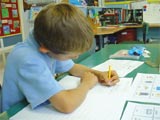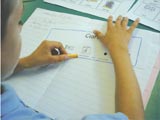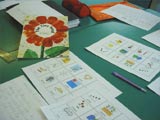Case Studies
Improving behaviour
David was in Year 3 (7-8 year olds) with learning levels of a Y1 pupil working at Level 1 of the National Curriculum. His language and communication skills were very poor and he found it difficult to express his ideas. David also had a weak auditory memory. He was not able to access the Y3 Curriculum without considerable differentiation of the material.



David had good visual skills as a learner and responded well to symbols and photos. He had initial sound recognition and the combination of this and the symbol helped him to work out the word and its meaning.
Staff used the symbol-supported calendar with him every day. By crossing off each day when it had passed he was able to work out what the day was. He could not have done this without the symbols for the days and months.
The photos show David writing independently using symbol word grids made in 'Communicate: In Print'. The key vocabulary was put into the grids in the sequential order of the story, 'The Tiny Seed' by Eric Carle. The teacher first read through the story making sure that David found the key vocabulary on his grid. The task was to retell his favourite part of the story. David did this by using the symbols as a visual prompt to remember the story and then by copying the word underneath the appropriate symbol. The teacher supported him in formulating each sentence and rehearsing it verbally before he tried to write it.
David's writing target, to put a capital letter at the beginning of a sentence and a full stop at the end, was also symbolised so it could be referred to and he could see it - another visual prompt.
David saw himself as a 'writer' in this session which greatly boosted his self-esteem. His behaviour in unsupported writing sessions when the material was not accessible for him was very different. He shouted out, distracted other pupils and was generally disruptive.
(Louise Wood, Weddington Primary)
